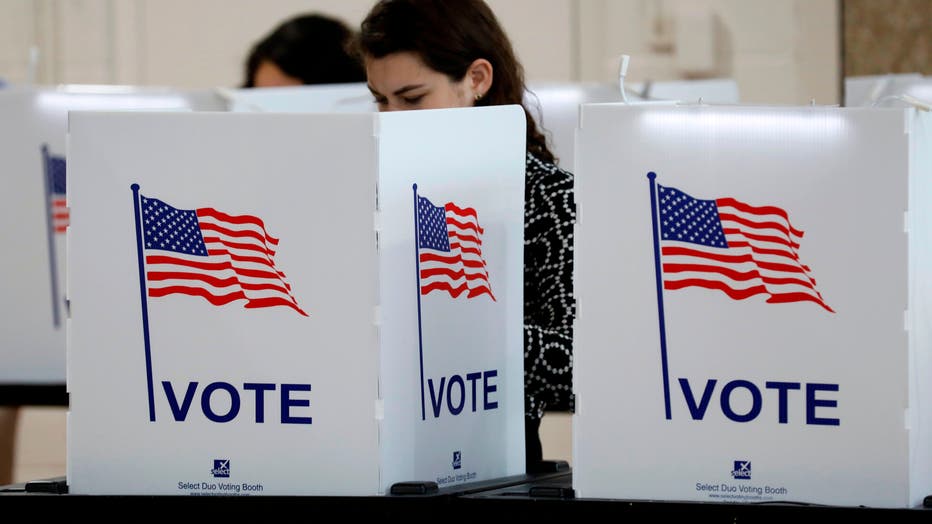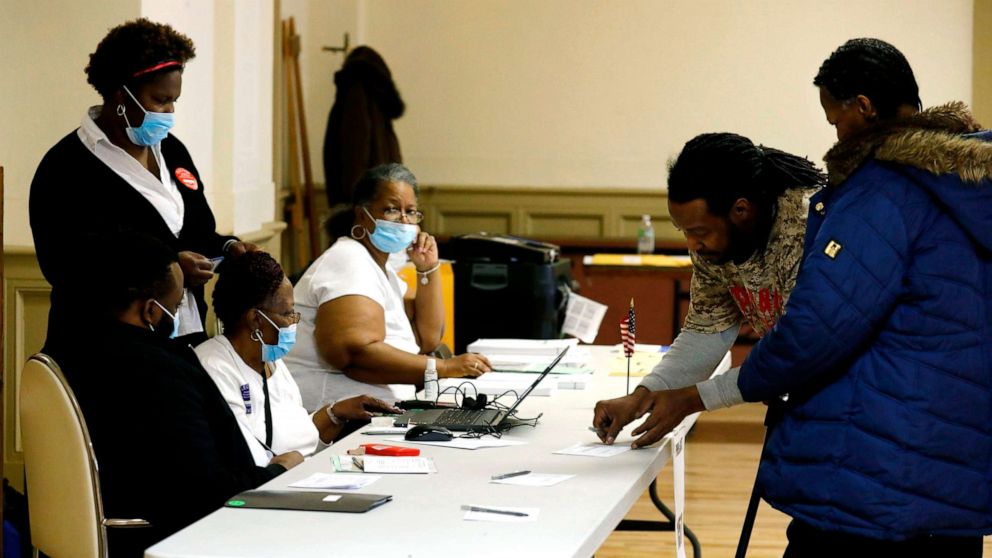Coronovirus affecting voters in primary elections | Primary election Michigan

Elections get put on hold for no one and nothing — not even the current COVID-19 pandemic. But, surmounting fears of the spreading coronavirus anticipate an impact on voter turnout. Now, amid a heated presidential election, two Democratic contenders are vying for votes in what is being referred to as “Super Tuesday 2.” On Tuesday, six state primaries will take place in Idaho, Michigan, Mississippi, Missouri, North Dakota, and Washington that will include Democratic presidential votes for either former Vice President Joe Biden or Senator Bernie Sanders. As a whole, there are 352 delegates at stake here.
Wyden’s bill also would give Americans the option to vote by mail in case of a widespread emergency. Sen. Ron Wyden (D) is proposing $500 million of federal funding to help states prepare for possible voting disruptions caused by the coronavirus outbreak.
Because of the current lack of a vaccine for the new coronavirus strain and confusing information being spread, panic has ensued many places. According to the Centers for Disease Control and Prevention (CDC), COVID-19 is spread through close contact (being within 6 feet of someone), bodily fluids, or through the air, new cases show.
In the 1990s, Wyden’s home state of Oregon became the first state to vote entirely by mail, and the practice has grown to the point that more than 31 million Americans — about one-quarter of all voters — cast ballots by mail in 2018. The legislation, to be filed Wednesday, could boost a national trend toward voting by mail.

But how might that affect the election? While hand sanitizer, washing hands, and keeping on top of hygiene is certainly a solution, widespread fear and fear mongering is having many people second-guessing leaving the house. Voters who are feeling extremely cautious or panicked about the coronavirus might feel unsafe entering a totally confined, crowded space with little space from other people, using pens and voting equipment that’s been touched by so many other people.
In this week’s primaries, only two of the states voting currently have any confirmed coronaviruses at all. Washington is currently reporting 100 cases, with 19 deaths from the illness, according to Johns Hopkins University’s Center for Systems Science and Engineering. On Super Tuesday, officials from California and Texas reported that poll workers weren’t showing up for their duties, citing fears of coronavirus. Idaho has no reported cases currently and those in the state are at little to no risk.
Missouri currently has one confirmed case and is testing for more, but the Secretary of State Jay Ashcroft said the government’s recommendation to the public at large is to “get out and vote” and that it will be safe because they’re used to having elections during flu season, anyway. Michigan, the state with the most delegates up for grabs, has no reported cases either, along with Mississippi and North Dakota.
Now, as the CDC recommends social distancing and large-scale gatherings like SXSW are being shut down out of precaution, electoral politics may be at risk of losing voters more than ever before. While many states have alternative voting solutions like mail-in ballots, many only provide in-person ballots on election days, which could pose a problem with CDC-recommended isolation efforts in the U.S. Currently, there are over 700 reported cases of coronavirus in the U.S., with hundreds of thousands affected overseas.
Before Super Tuesday, there were concerns about coronavirus and its effects on voter turnout — since, poll numbers did show that there was a lack of voter turnout in many primary-voting states, though it’s unconfirmed if this was a result of voter suppression, long lines, or pandemic panic.
Election officials and experts in recent days have been considering how they would handle a major disease outbreak in which quarantines or closures of facilities would affect Americans’ ability to vote in primary elections, party caucuses and the November general election. States that handle few mail-in ballots might struggle to build the systems and acquire the machinery, such as high-speed optical scanners, needed to expand the option.
The wide variation in practices could make it difficult to rapidly expand voting by mail in time for this November’s election.
officials stated that postponing voting is definitely not an option. Although Tuesday’s polling places are reportedly providing sanitizers and Clorox wipes. “It really comes down to trying to find alternative methods to executing an election,” Idaho chief deputy secretary of state Chad Houck said in the Washington Post. “And those conversations are definitely happening.”

Elections get put on hold for no one and nothing — not even the current COVID-19 pandemic. But, surmounting fears of the spreading coronavirus anticipate an impact on voter turnout. Now, amid a heated presidential election, two Democratic contenders are vying for votes in what is being referred to as “Super Tuesday 2.” On Tuesday, six state primaries will take place in Idaho, Michigan, Mississippi, Missouri, North Dakota, and Washington that will include Democratic presidential votes for either former Vice President Joe Biden or Senator Bernie Sanders. As a whole, there are 352 delegates at stake here.
Wyden’s bill also would give Americans the option to vote by mail in case of a widespread emergency. Sen. Ron Wyden (D) is proposing $500 million of federal funding to help states prepare for possible voting disruptions caused by the coronavirus outbreak.
Because of the current lack of a vaccine for the new coronavirus strain and confusing information being spread, panic has ensued many places. According to the Centers for Disease Control and Prevention (CDC), COVID-19 is spread through close contact (being within 6 feet of someone), bodily fluids, or through the air, new cases show.
In the 1990s, Wyden’s home state of Oregon became the first state to vote entirely by mail, and the practice has grown to the point that more than 31 million Americans — about one-quarter of all voters — cast ballots by mail in 2018. The legislation, to be filed Wednesday, could boost a national trend toward voting by mail.

But how might that affect the election? While hand sanitizer, washing hands, and keeping on top of hygiene is certainly a solution, widespread fear and fear mongering is having many people second-guessing leaving the house. Voters who are feeling extremely cautious or panicked about the coronavirus might feel unsafe entering a totally confined, crowded space with little space from other people, using pens and voting equipment that’s been touched by so many other people.
In this week’s primaries, only two of the states voting currently have any confirmed coronaviruses at all. Washington is currently reporting 100 cases, with 19 deaths from the illness, according to Johns Hopkins University’s Center for Systems Science and Engineering. On Super Tuesday, officials from California and Texas reported that poll workers weren’t showing up for their duties, citing fears of coronavirus. Idaho has no reported cases currently and those in the state are at little to no risk.
Missouri currently has one confirmed case and is testing for more, but the Secretary of State Jay Ashcroft said the government’s recommendation to the public at large is to “get out and vote” and that it will be safe because they’re used to having elections during flu season, anyway. Michigan, the state with the most delegates up for grabs, has no reported cases either, along with Mississippi and North Dakota.
Now, as the CDC recommends social distancing and large-scale gatherings like SXSW are being shut down out of precaution, electoral politics may be at risk of losing voters more than ever before. While many states have alternative voting solutions like mail-in ballots, many only provide in-person ballots on election days, which could pose a problem with CDC-recommended isolation efforts in the U.S. Currently, there are over 700 reported cases of coronavirus in the U.S., with hundreds of thousands affected overseas.
Before Super Tuesday, there were concerns about coronavirus and its effects on voter turnout — since, poll numbers did show that there was a lack of voter turnout in many primary-voting states, though it’s unconfirmed if this was a result of voter suppression, long lines, or pandemic panic.
Election officials and experts in recent days have been considering how they would handle a major disease outbreak in which quarantines or closures of facilities would affect Americans’ ability to vote in primary elections, party caucuses and the November general election. States that handle few mail-in ballots might struggle to build the systems and acquire the machinery, such as high-speed optical scanners, needed to expand the option.
The wide variation in practices could make it difficult to rapidly expand voting by mail in time for this November’s election.
officials stated that postponing voting is definitely not an option. Although Tuesday’s polling places are reportedly providing sanitizers and Clorox wipes. “It really comes down to trying to find alternative methods to executing an election,” Idaho chief deputy secretary of state Chad Houck said in the Washington Post. “And those conversations are definitely happening.”

